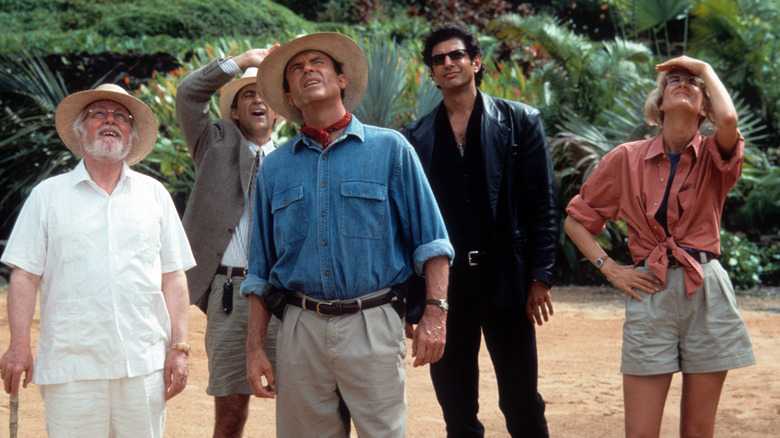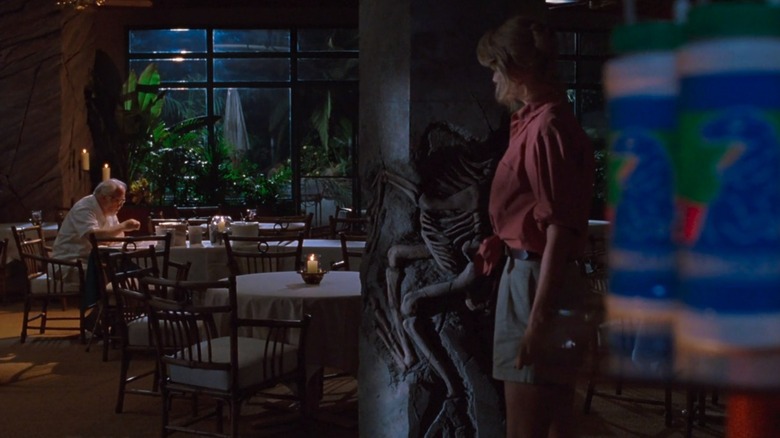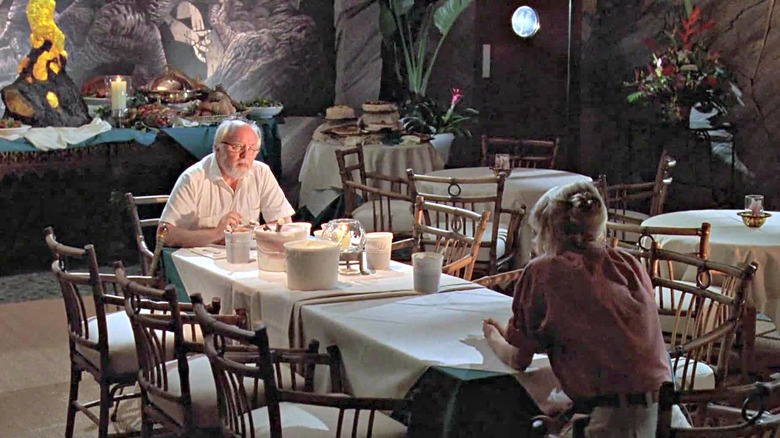The Best Scene In The Jurassic Franchise Doesn't Even Have Dinosaurs In It
1993 was a very different time, to say the least. For all the (well-deserved) accolades foisted upon the Steven Spielberg classic "Jurassic Park," praising its practically seamless visual effects and quintessential sense of awe while recreating long-lost creatures in a way we'd never seen them before, newcomers to the film might be surprised by how little screen time the dinosaurs actually receive. Granted, the entire film opens on a dino-centric sequence that quickly turns horrific, in which a group of park employees learn the hard way that even the simplest tasks are anything but when it comes to transporting fearsome velociraptors brought back from extinction. Yet even in this haunting sequence ("Shoooooot her!"), the razor-toothed culprit responsible for the attack is largely left unseen, setting the tone for what's to come.
Of course, "what's to come" only turned out to be some of the greatest large-scale action that the genre has to offer. But what if I told you that the most effective scene in the film — the entire franchise, even! — was a subdued, dialogue-heavy moment set in a dining room, with nary a dinosaur in sight?
Director Colin Trevorrow is about to conclude his new trilogy with this week's "Jurassic World Dominion," which seems to have picked up and run with the "bigger = better" approach prevalent in Trevorrow's part of the franchise and throughout so many modern blockbusters, standing in stark contrast to the balanced restraint and spectacle of the original. In that light, this is the perfect time to look back at that one particular sequence that best embodies the unparalleled joys of "Jurassic Park." While its action set pieces get the lion's share of the spotlight, nothing quite manages to compare to the quiet emotional devastation of this dinner table scene.
A monument to failure
It's easy to lose sight of the fact that David Koepp's screenplay takes a minimalist approach to showing off the living and breathing dinosaurs. Until the second act, at which point Spielberg dials up the action and almost unbearable levels of dread as the park systematically falls apart around our main characters. But there's one crucial aspect that "Jurassic Park" understands more than any of its predecessors: the need to ease off the gas pedal and give audiences a chance to catch their breath.
Nestled comfortably in between the famed Tyrannosaurus Rex paddock escape and the Gallimimus stampede, we take a break from the carnage to check back in on the reason we even care about any of this happening in the first place — the characters. After the group has been separated and hopelessly scattered across the island, Laura Dern's pragmatic but profoundly tired Ellie Satler finds wealthy park owner John Hammond (Richard Attenborough) seated alone amid a stately (and absurdly luxurious) dining room indulging in melting ice cream, a mere shell of the ebullient showman who welcomed them to the park with a flourish only hours before. With key assists from John Williams' magnificently refined score and Spielberg's deft touch, this one scene manages to sum up many of the core ideas of the film in a way that few big-budget movies bother to make time for anymore.
A slow pan across shelves full of "Jurassic Park" merchandise reveals Ellie taking a moment to silently observe Hammond in the background, just one of the film's many pointed statements about rampant commercialism and greedy excess and also an underrated example of Spielberg and director of photography Dean Cundey's finesse behind the camera. Eventually, Ellie joins her host at the far end of the table, surrounded by fossilized reminders of the very real dangers encroaching upon them from all sides. It's here where, after a quick update on their injured friends and Hammond's unconvincing reassurance that Alan Grant (Sam Neill) is the perfect person to bring young Tim (Joseph Mazzello) and Lex (Ariana Richards) back to safety, the defeated yet defiant park owner launches into a soliloquy that encapsulates the exact sort of arrogance and misplaced confidence that landed them all in this mess in the first place.
Until this point, viewers have been conditioned to see John Hammond as a lovable, almost bumbling grandfatherly figure (a far cry from the overtly unlikable character in Michael Crichton's book) whose reach keeps exceeding his grasp. He's been cut down to size by the always-blunt Ian Malcolm (Jeff Goldblum), undercut by the treacherous Dennis Nedry (Wayne Knight), and had his helplessness put on full display as his theme park attractions failed one after another — at the cost of actual lives, tragically enough. Here, we finally get to see a new layer of hubris as he details his well-intentioned motivations for creating the park.
The fallacy of flea circuses
Having first received his start by creating automated flea circuses for curious children and their knowing parents to gawk at, Hammond lays out his desire for Jurassic Park to recreate that wonder on a far greater scale with "something that was real." Seemingly looking to Ellie for a sign that he isn't some sort of monster, she instead gently reminds him that he can't remain emotionally detached from the events happening all around them. In a testament to both Attenborough and Dern's acting prowess, their calmness promptly explodes into something much uglier when Hammond doubles down on all the misguided instincts that led to the park's failure. Blaming Nedry and reliance on automation as the real culprits instead of himself, Hammond foolishly looks ahead to ironing out all the flaws "next time."
Coming so close on the heels of their brush with death, Ellie's flash of temper feels like the most natural response in the face of such self-righteousness. "You never had control, that's the illusion! I was overwhelmed by the power of this place, but I made a mistake, too. I didn't have enough respect for that power and it's out now." His stunned silence says it all, with only her awkward extension of an olive branch by eating a spoonful of ice cream to break the tension.
Remember when characters used to actually have conversations in four-quadrant blockbusters? If you ever wondered what elevated "Jurassic Park" from a schlocky B-movie to something more, look no further than this stretch of four minutes. With nothing but the subtext-rich dialogue and a pair of powerhouse performances, this scene holds up just as well as all the dinosaur mayhem.


